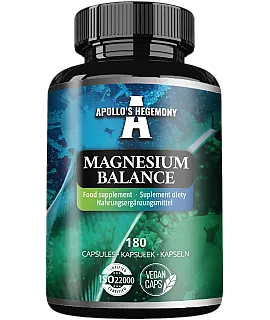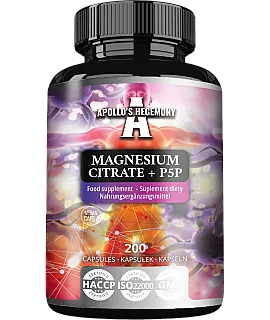Magnesium - what is it and what properties does it have?

What do you associate magnesium with? This element has versatile effects, so it can be associated with a huge number of benefits. We can think of it as a remedy for muscle twitching, for stress and emotional tension, for sleep problems. We can associate it as an electrolyte or bone component. And all of these associations are correct! From this article you will learn what magnesium is and why we need it so much.
- The role of magnesium in the human body
- Magnesium deficiency is a common problem!
- Benefits of magnesium supplementation
- Magnesium in dietary supplements
- Magnesium is also used in clinical practice
- Summary
The role of magnesium in the human body
Magnesium is one of the most important and common elements on Earth. It was first isolated in its pure form in 1808 by Humprey Davy. Due to the versatility and seriousness of its role, magnesium is often referred to as the macro element of life. It acts as a cofactor for more than 300 enzymatic reactions! It is an element used for:
- production and activation of enzymes,
- Adenosine-5′-triphosphate (ATP) metabolism,
- DNA and RNA synthesis,
- carbohydrate, protein and lipid metabolism,
- catalysis reactions,
- transmission of nerve signals,
- regulation of muscle contraction,
- regulation of blood pressure and cardiac excitability.
Due to the numerous properties of magnesium in the human body, it plays an important role in preventing and alleviating the symptoms of many diseases. Low magnesium levels are associated with many chronic diseases, such as Alzheimer's disease, insulin resistance and type 2 diabetes, hypertension, cardiovascular disease (such as stroke), migraine headaches and attention deficit hyperactivity disorder (ADHD).
The body of an adult weighing about 70 kg contains about 20-35 g of magnesium. Of this, 60% comprises stores in the bones, 39% inside muscle cells, and the remaining 1% circulates in the blood and other tissues. In cells, magnesium is mainly accumulated in mitochondria, demonstrating its momentous role in regulating energy metabolism.
Magnesium deficiency is a common problem!
Imbalances in magnesium metabolism, primarily hypomagnesemia (much more common than hypermagnesemia), can result in neuromuscular, cardiac or nervous disorders.
Insufficient magnesium supply can affect up to more than half of the adult population in developed countries. This may be due both to the deterioration in the quality of widely available food and simply to inadequate nutrition education and poor dietary choices by the average person. High levels of food processing and deterioration in the quality of the soils on which crops are grown are also a problem. It is not uncommon for deficiencies to be fostered by various health disorders (intestinal malabsorption, kidney disorders, diabetes, hyperthyroidism or parathyroidism) or medications used (including antibiotics, proton pump inhibitors, diuretics and many others).
Magnesium deficiency in food is associated with many minor ailments, but more serious consequences can also occur. Its chronic deficiency has been linked to the occurrence of diseases of civilization, such as atherosclerosis, coronary heart disease and cancer.
Benefits of magnesium supplementation
If you are affected by magnesium deficiency, with supplementation you may notice, among other things:
- reduction in fatigue and tiredness,
- less irritability,
- better muscle function,
- easier relaxation,
- fewer symptoms of stress,
- better blood pressure and heart function.
There are also several practical advantages:
- low cost of supplementation,
- low risk of side effects,
- a very large selection of preparations on the market,
- easy availability.

Magnesium in dietary supplements
Dietary supplements with magnesium differ, among other things:
- the form of magnesium,
- the amount of ions per serving,
- additional ingredients,
- form: capsules, tablets, powder, dissolving pastilles.
How to choose a good magnesium supplement? The most important criterion should be the form of magnesium. Organic forms are considered much better absorbed than inorganic ones. The reason is mainly better solubility in water. Examples of noteworthy organic forms:
- magnesium citrate,
- magnesium malate,
- magnesium taurate,
- magnesium diglycinate,
- magnesium lactate,
- magnesium aspartate.
Some magnesium supplements combine several different magnesium compounds. They can be a good choice for people who are not sure which compound will be most beneficial for them.
[carousel with AH Magnesium Balance, MZ Mag Complex and other complexes].
Are inorganic forms worthless? They are usually not the preferred form for supplementing magnesium by oral supplementation, but they still have various uses. For example, magnesium oxide, which is very poorly absorbed, is used orally for constipation, as it facilitates bowel movements (if you are not constipated, it can even cause diarrhea) or for hyperacidity, as it neutralizes gastric juices. Magnesium chloride and magnesium sulfate are used as aqueous solutions for magnesium baths, for example. Magnesium sulfate is also administered in hospitals intravenously as an IV.
A noteworthy parameter is the addition of vitamin B6, which has the ability to increase the absorption of magnesium. As long as there are no contraindications, it is worth choosing magnesium that also has vitamin B6 in its composition.
Magnesium is also used in clinical practice
Magnesium supplementation is often recommended by doctors as a supplement to treatment in various cases. This includes both oral supplementation and sometimes intravenous administration of magnesium sulfate preparations in cases of hospitalization. Below are clinical ailments against which the utility of magnesium has been studied:
- Type II diabetes,
- metabolic syndrome
- hypertension,
- ischemic heart disease,
- myocardial infarction,
- stroke,
- pre-eclampsia and eclampsia,
- migraine headaches,
- ADHD,
- Alzheimer's disease,
- asthma.
Summary
Magnesium is an extremely versatile element. It supports the functioning of the entire body, but is especially important for maintaining good energy metabolism and the work of the nervous and cardiovascular systems. The modern diet often does not provide adequate amounts of magnesium, so magnesium supplementation is readily used and has noticeable effects.
If you feel that your diet does not provide an adequate amount of magnesium and you are experiencing symptoms characteristic of magnesium deficiency, you may want to consider magnesium supplementation. It's best to supplement the amount that your diet lacks on average, but if it's hard to estimate, at least 100-200 mg of magnesium ions per day is usually used.
Sources:
 ⮜ Previous article
⮜ Previous article
Zinc deficiency - what are the symptoms?
 Next article ⮞
Next article ⮞


